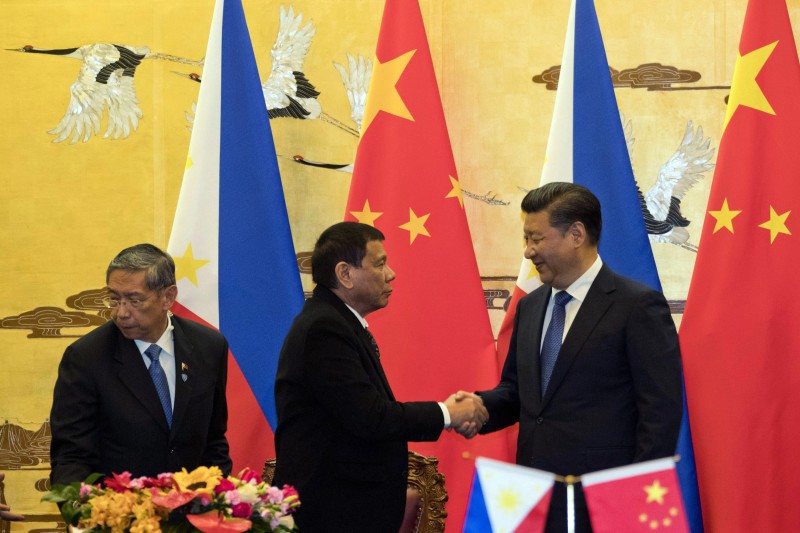Duterte in China

Philippine President Rodrigo Duterte, center, and Chinese President Xi Jinping shake hands after a signing ceremony in Beijing, China, Thursday, Oct. 20, 2016. Duterte was meeting Thursday with Xi in Beijing as part of a charm offensive aimed at seeking trade and support from the Asian giant by setting aside a thorny territorial dispute. (AP Photo/Ng Han Guan, Pool)
Yesterday, the most powerful Chinese leader since Mao Zedong hosted the most politically dominant Philippine leader since Ferdinand Marcos—and it made for dramatic geopolitical theater. A smiling President Xi Jinping warmly welcomed President Duterte to the Great Hall of the People in Tiananmen Square, the symbolic heart of the Chinese state. A solemn Mr. Duterte, famous for wearing jeans to official occasions, even dressed the part, wearing a suit and tie. Partly because he seems determined to complete his administration’s so-called pivot to China, the welcome ceremony was a stirring spectacle. A spectator could be forgiven for thinking that history was turning.
The reception was the culmination of an extraordinary five-month journey for Mr. Duterte, beginning soon after he was elected president. He met with the Chinese ambassador to the Philippines in Davao City, in a sit-down meal complete with printed menus; the envoy was the first diplomat to meet the then President-elect, and the one to have met him the most number of times since then.
Article continues after this advertisementMr. Duterte changed his rhetoric on the South China Sea dispute from fly-the-flag-from-a-jetski bravado to the language of economic cooperation. He muted any celebration over the Philippines’ landmark decision at the Permanent Court of Arbitration in July, and ever since followed a we-will-not-insist policy. He then called the PH-US security alliance into question, beginning with vigorous personal insults directed at US President Barack Obama; stopped Philippine participation in South China Sea patrols; urged American forces to leave Mindanao; ordered an end to the regular conduct of military exercises with the United States; and, on the eve of his meeting with Xi, sent a message to America: “Time to say goodbye.”
By design, his “sum total” approach to Philippine-Chinese relations is now center stage: a calibrated attempt to lower tensions related to the South China Sea disputes, a greater focus on trade and economic issues, and also a willingness to use Chinese largesse to fill the infrastructure deficit in the Philippines.
He did not surrender the country’s claims; he told reporters it was not the right time to press them. He “can’t destroy the goodwill just by blurting out something,” he said. “The question again is there’ll be a time that you have to talk about it. Of course there will be a time, because, you know, there are also countries around that. But it is not the time to quarrel.”
Article continues after this advertisementBeijing responded to the President’s many gestures effusively. Vice Foreign Minister Liu Zhen Min called the Duterte state visit “highly successful” even before it had reached its halfway point, and said it “signifies full return of China and Philippine friendship back to normal level.”
“A new stage is now open between the two countries to address the South China Sea issue through bilateral discussions, and it means full recovery of the traditional friendship between China and the Philippines,” the Chinese official said after the two presidents held bilateral talks. This new stage included “practical cooperation, bilateral commerce, trade and technology.”
The series of government-to-government agreements (eight in all) and business deals (also eight in total) previously announced and signed starting Thursday provides proof of this “new stage” in bilateral relations. But is it, in fact, a turning point in Philippine history?
It has the potential to be. The pivot to China is based on Mr. Duterte’s assumption, articulated expressly on the eve of the meeting with Xi, that the United States is the villain in his interpretation of Philippine history, and China is “good.” In contrast with the Americans, who seized the Philippines and occupied it for half a century, China “has never invaded a piece of my country all these generations,” he asserted.
Filipinos who are concerned by the Chinese occupation of Mischief Reef and Scarborough Shoal might view the matter differently, but there is no question that, billion-dollar deals aside, a far-reaching alliance with China is, by definition, historic.
RELATED VIDEOS
















